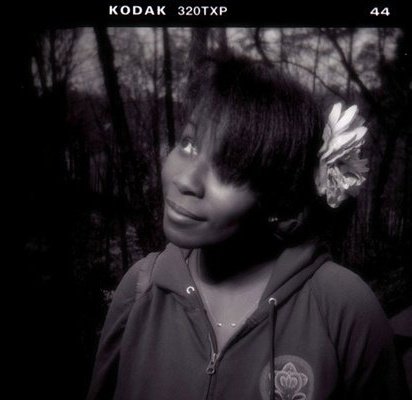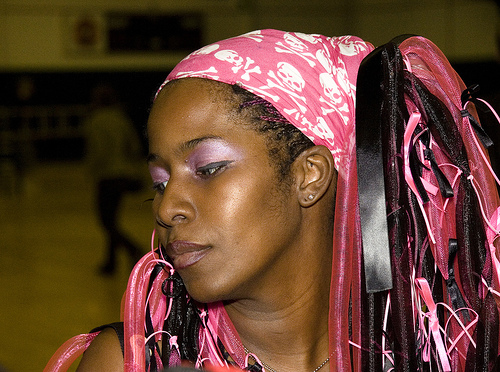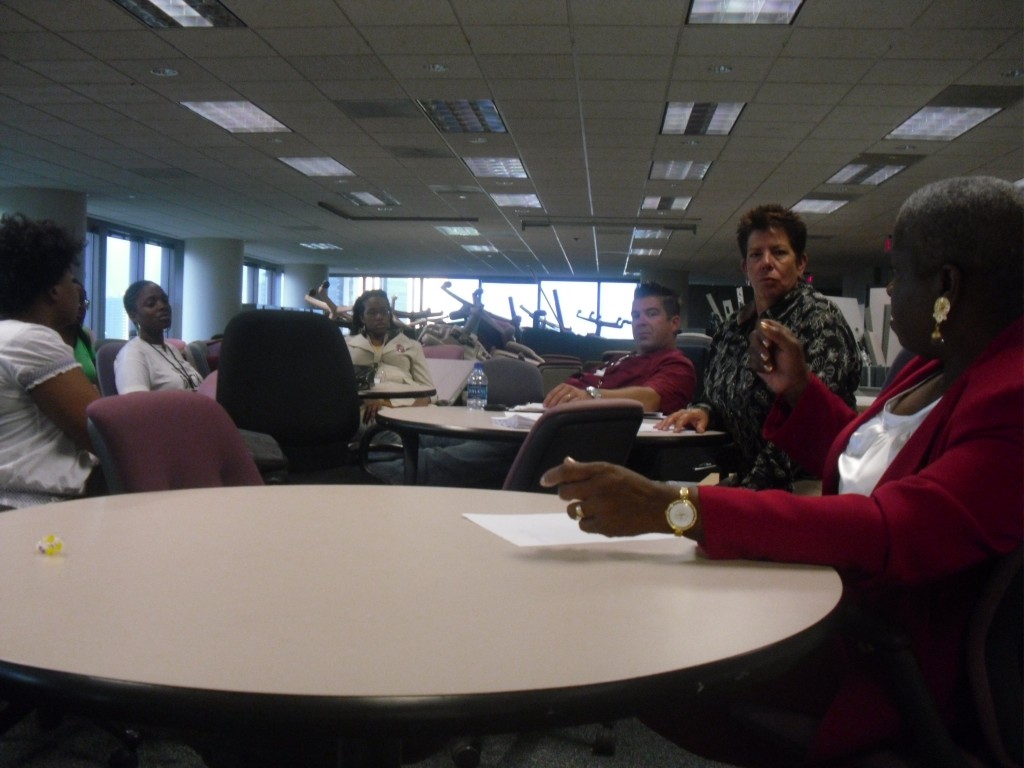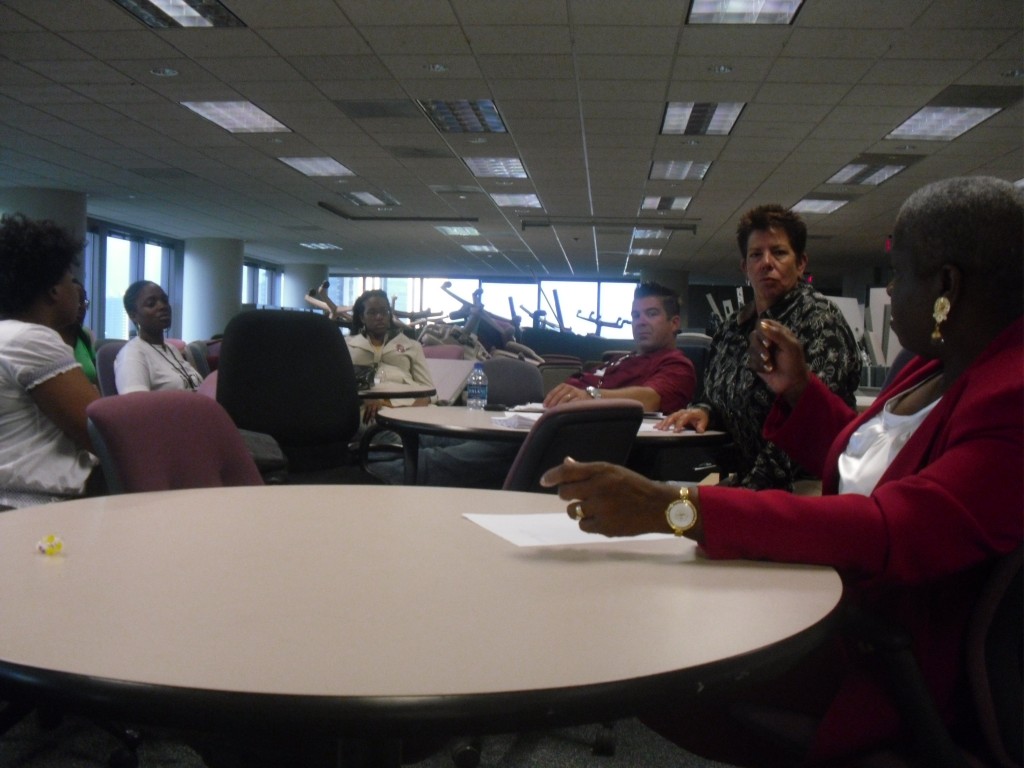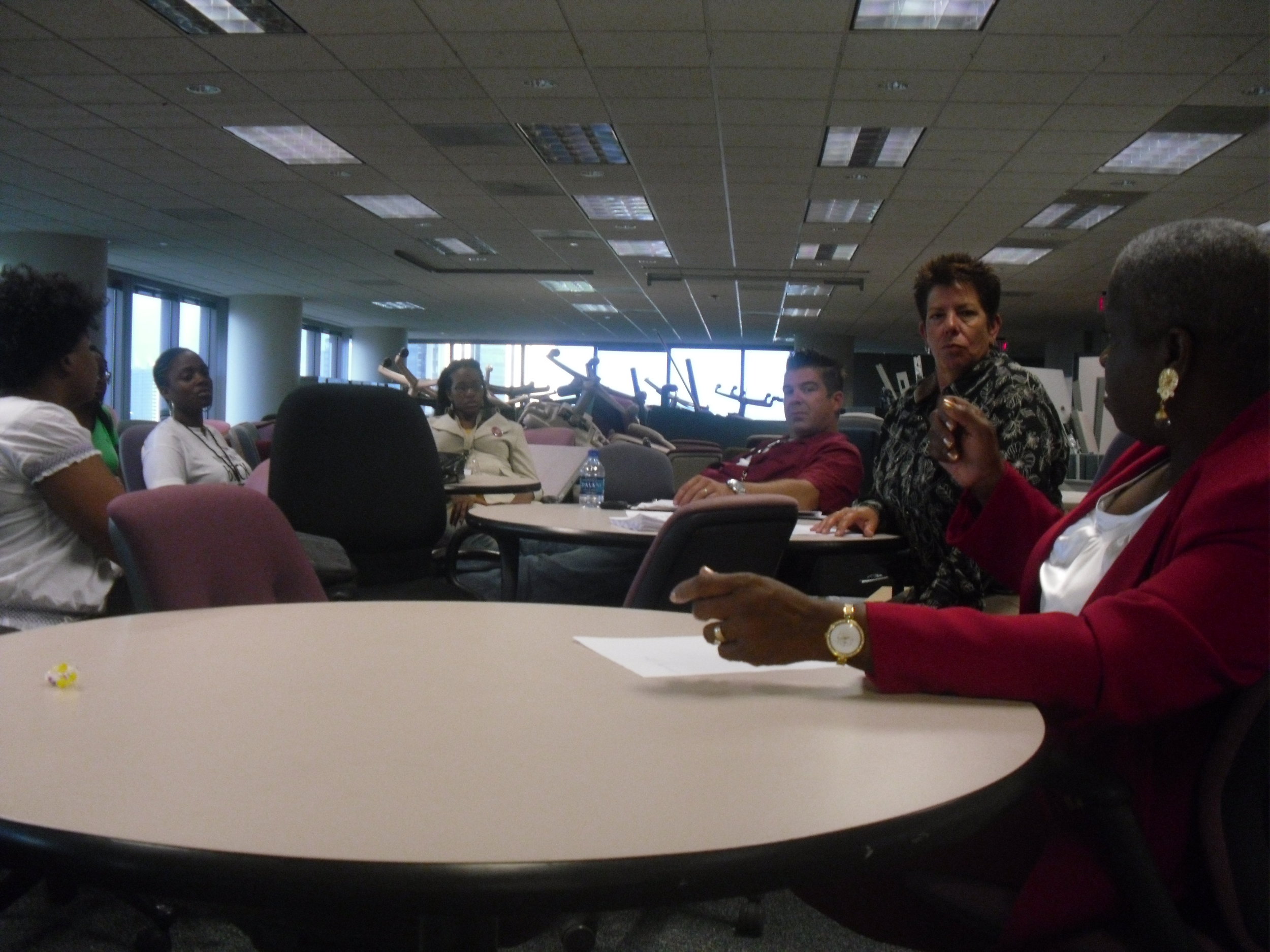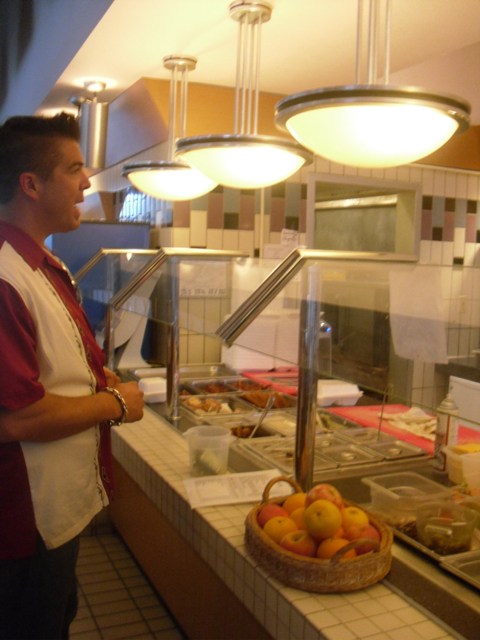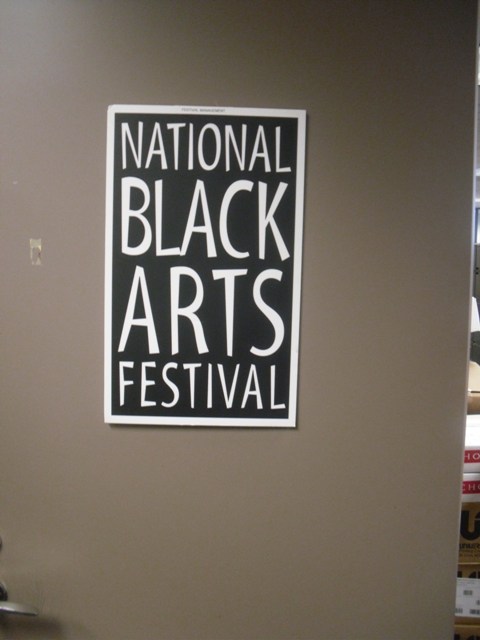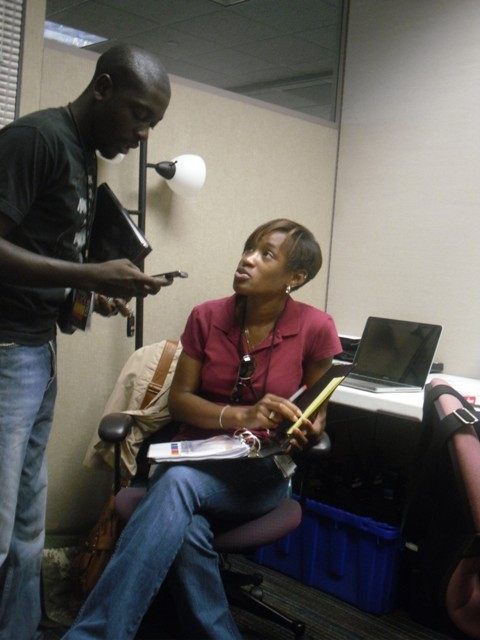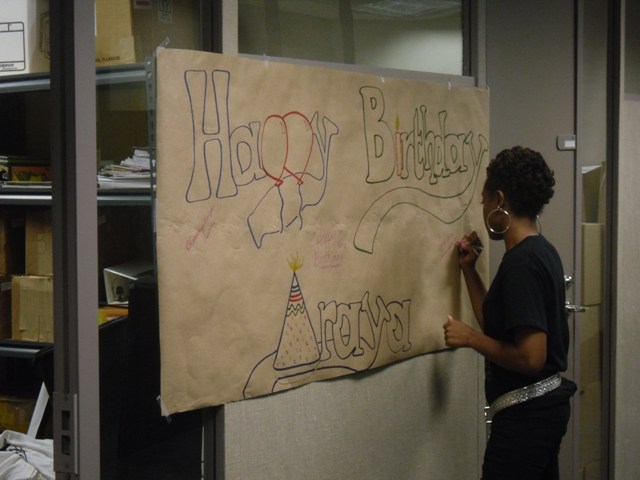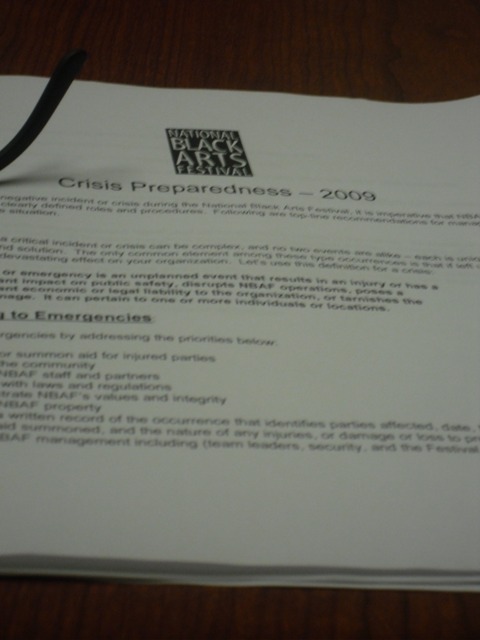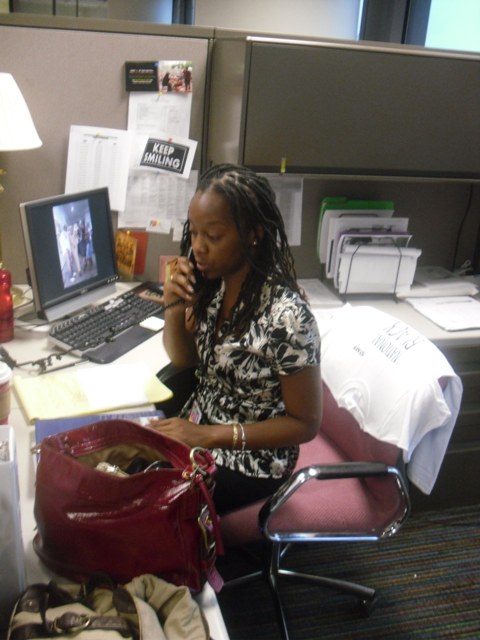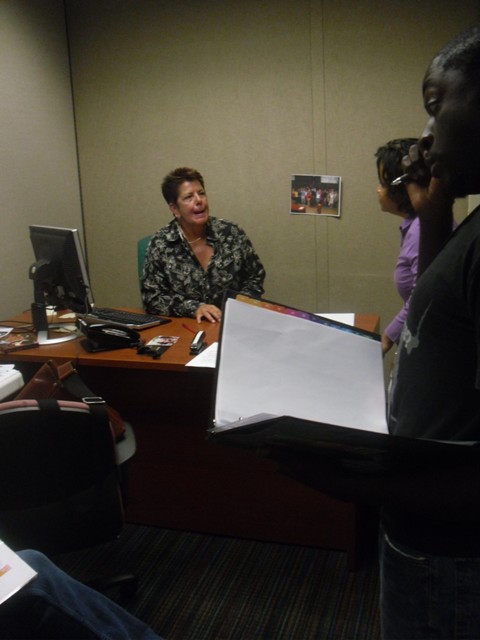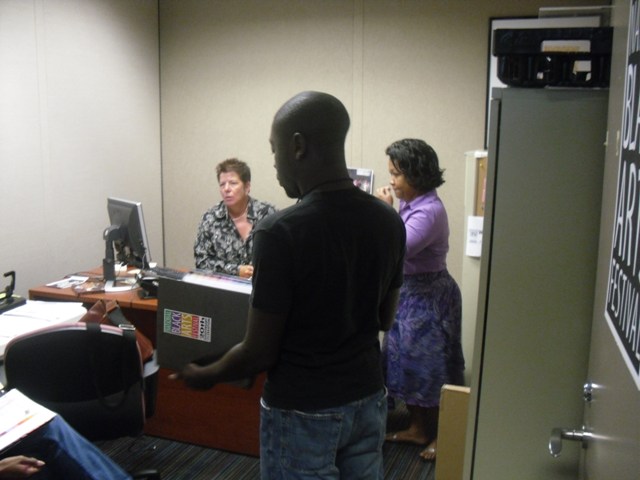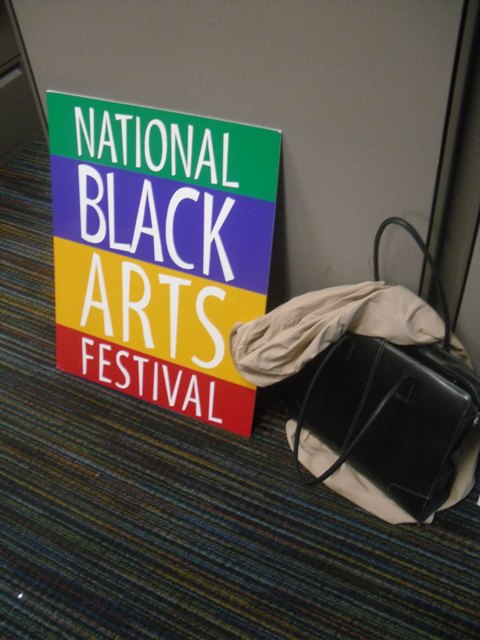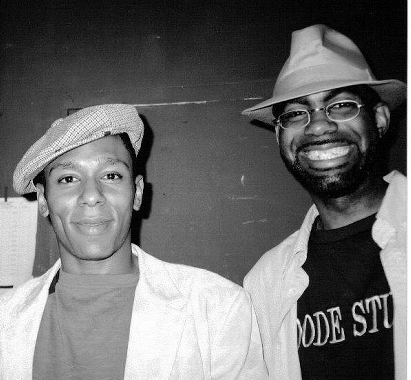shifting into manic with atlanta photographer gudrun stone
Gudrun (pronounced: 'good-drun') Stone continues to build a reputation for herself as a rising star in Atlanta's artist community. She excels at capturing the energy and passion of stage and concert performances - Van Hunt, Brittany Bosco, and countless visiting artists at the annual National Black Arts Festival have all found themselves in front of her lens. Her first solo photography exhibit - Long Exposures, which debuts at the Ferst Center on April 11 - is just another milestone on her journey of evolution as an artist, and a multi-faceted human being. I sat down with Gudrun to talk about the upcoming exhibit and to get some insight into what helps her bring her visions to life on film.
So tell me a little about yourself. Where you’re from, about your brothers and sisters, your criminal record and things like that. I’m a real live Georgia peach. I grew up off McAfee and Glenwood. My Grandpa used to own the corner store near East Lake Elementary. We moved to North Dekalb in 1985. My grandmothers still live near East Atlanta Village, so I still say I’m from Decatur.
Art comes from my mother – she’s one of 9 kids and each one has an artistic avenue. We ‘downloaded’ that through good DNA. Mom raised us in museums. She did interior decorating, too. So, color came to me at a very young age. My parents became non-traditional students. And when they went back to college, I went with them. I say that I went to college my whole life. I grew up in the art department of the school, listened to WCLK, Ken Rye, Ken Batie – all of them growing up.
The surprising thing is that I’m not a painter or graphic designer. I started doodling and even designed my own comic strip. I used to draw on myself. I would sit in class all day and draw, and when I ran out of sketch pad paper I drew on my wrists, my ankles.
And then in my early 20s I just stopped everything and I worked.
What kind of work did you do? I’ve been in public service my whole career. I was a page for Dekalb county public library system, and I was a photography assistant for the Governor’s office for 1.5 years.
So how did you get your start with photography? Was that your first run in?
Oh, my dad took pictures of everything. At Thanksgiving dinner he took pictures – and not just pictures of us at the  table. Pictures of the food, you know, moving it around to shoot it just right. Both of my parents were very detail-oriented about what they did. My dad would experiment taking pictures of me on different settings – light, dark. The internship just sort of fell into my lap.
table. Pictures of the food, you know, moving it around to shoot it just right. Both of my parents were very detail-oriented about what they did. My dad would experiment taking pictures of me on different settings – light, dark. The internship just sort of fell into my lap.
But you asked about brothers and sisters? I have an older brother, Thelonious – named after the monk, not the musician. Both of us were musicians growing up. I had a sort of a hero complex. We didn’t go to school at the same time, but my brother had been a musician in high school – you know jazz band and all that – and sort of became big man on campus. So by the time I got there, he wasn’t there anymore, but the people who knew him sort of took me under their wing. I didn’t get into art until my junior year. But it was good that I followed in my brother’s footsteps. Music is a part of the art for me.
Your name is pretty unique. Is there a meaning behind the name? My father named me. My father was drafted for Vietnam, but he never made it, he was stationed in Germany. He took the opportunity to learn as much as he could about the culture, and he heard the story of Gudrun. The name means, ‘secret keeper of the gods; divine wisdom; battle friend’. It’s from the Volsungasaga. It freaks German people out when they see that I have that name. And of course I used to get picked on as a kid.
Uh-oh, what were some of the nicknames? Bad Run. Goodie-Goodie Two Shoes. But what I realized when I got older is that my name could have been Susie Q and people still would have made up names. I’m thankful to my dad because I have this great name and it’s an ice breaker, a conversation starter.
On your blog, you describe yourself as a little bit redneck, a little bit ghetto,a whole lot of suburbia and a dash of glamour. Explain what you mean by that. I was raised in Chamblee - Tucker, I’m a product of Dekalb County public schools. I hate when people say the public schools system fails. A lot of what I have comes from public schools.
I love to go to East Atlanta Village, but I hate to go to East Atlanta Village. It kills me when all the hipsters complain about suburbanites coming over there. It used to be all black-owned. What used to be Willie’s Bakery is now a sushi restaurant. I used to get my hair done at the flea market building that shares the lot with The Earl. What’s hip and popular now, were thriving, black-owned businesses. And we had something. That was our community.
When we moved to North Dekalb, it wasn’t uncommon to see people come to school on a tractor. So, I listen to country music. I used to want a Toyota Tacoma pickup truck, raised, with roll bars. People say, ‘you talk white’. I’m like, no I don’t. I talk proper. I speak the Queen’s. What you see is only a quarter of who I am.
Do you find it challenging to be an artist now, to make a living off of your art? Yep. That’s why I have a day job. I love that we have a strong art community here. Michi, Dubelyoo, Dosa Kim, Fahamu, Russell Gunn. We have this beautiful art community. But people in the A always want a hookup, they want free.99, or to barter… which is fine, up to a point.
Yeah, the landlord doesn’t take barter. Right? Georgia Power won’t accept barter. I mean I barter too, but I always tip in cash. So there’s a place for it, and people have to remember that. You know, I’m here in Atlanta now, but in 20 years, I probably won’t be in Atlanta anymore. Other cities, like St. Louis; San Francisco; Venice, California… New York – people are willing to pay for work. I can recall sitting in coffee shops when I was in Venice and seeing people who’d come in and be so inspired by art hanging on the wall in the shop, that they’d buy a $200 piece right there, while they were just waiting in line for a bagel. Whereas here, I see people go, “Oh, I really like this. I’m not gonna buy it, I’ll just take a picture of it and make it a screensaver.”
I want for Atlanta to realize what they have. We have the seedlings of a great art scene. I should have more options than to go dance my booty off until 3 am. You can go to a museum in New York at 1 or 2 in the morning. Atlanta is my home, I don’t want to have to go somewhere else to be able to be a self-sustaining artist. If you can’t afford the $300 work, come up to me and say, I can’t afford this huge, framed piece, but do you have an 8x10 unframed print in my price range?
How did you get started with the National Black Arts Festival?
Mike Moss – I believe he was looking for someone to do something rock-ish. He wanted something with a little edge. He did a search on Myspace – back then I was still on Myspace – and he reached out and contacted me. It was a while before we actually connected. And then all of a sudden he calls me up like, “I want you to come shoot Van Hunt”. I’m like 'what?' This has gotta be a joke. This guy’s up to some skullduggery and mischief – I mean, I didn’t even know who 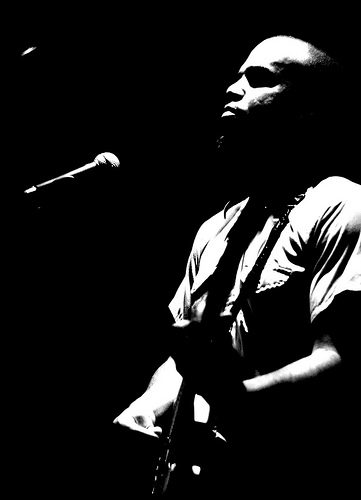 Mike was. So I go and meet them at Apache, and I sat outside in my truck for a while trying to decide if I was actually going to go in. I finally did, and Mike takes me to the back and goes, “This is Van,” you know, like it was nothing. Meanwhile, I’m so excited that I can’t even answer when Van asks me what my favorite song of his is. It’s ‘Dust’, by the way. I shot Van Hunt that night and I think there was only like 1 shot that he didn’t like.
Mike was. So I go and meet them at Apache, and I sat outside in my truck for a while trying to decide if I was actually going to go in. I finally did, and Mike takes me to the back and goes, “This is Van,” you know, like it was nothing. Meanwhile, I’m so excited that I can’t even answer when Van asks me what my favorite song of his is. It’s ‘Dust’, by the way. I shot Van Hunt that night and I think there was only like 1 shot that he didn’t like.
About a week later I got another call from Mike. He says, "We want you to shoot the festival". I’m like, really? So they tell me to look at the schedule and pick what events I want to shoot at. You know that dream you have… where you’re walking through a store, shopping and picking out everything, and then when you get to the check-out, you wake up? Yeah, that was sort of like that dream for me.
So I shot the (2008) festival. And by the time I was done I had like 9,000 photos. Leatrice (Ellzy) and Mike were like, “What didn’t you take?” But for me it’s the little things, all these little moments….
The festival allows me to shoot the way I shoot for myself.
So how did you hone your photographic skills? I’m pretty much self-taught. I had a year in the darkroom learning the ropes, and trial and error. A lot of trial and error.
A lot of people might not know this about you, but you were the first Black Atlanta Rollergirl. What brought you and roller derby together? I came across the Atlanta Rollergirls on Myspace back in ’05. I really just wanted to shoot some sports photography. I reached out to The Notorious R.I.P. (aka, Gabby), and asked if I could come to a practice and shoot. And she was like, “You can come to practice and try out”. After she didn’t budge, I had my whole McGuyver thing planned out. I figured I’d go do a couple of laps and fake being out of breath, and just hang out on the side and shoot from the waist. But that Monday night was like something from a movie. I was sitting there and these 4 girls walk in – and it was like they were
moving in slo-mo – I think it was Princess Lay You Out, Demi Gore, Chelle Shocker. I saw them and thought, “These might be my people”. I took a couple of laps, fumbled a little, felt like a kid again, and all of a sudden it was like, this is something I want to do.
I had always had guy friends. It wasn’t until I did roller derby that I had girl friends. And there was none of that Real Housewives of Atlanta drama – it was a sisterhood I had never had in the Black community. If I was ever in a Turkish prison, these girls would come bail me out. It was a real growing period. Before then I was ‘normal’. I had no visible tattoos, didn’t have my sleeve yet. After that I got pink braids… all of a sudden I could do things like that. My parents always brought me up to be straight-laced.
I did roller derby for 3 years. But it was time consuming. It was like having a part-time job you didn’t get paid for. I got sick for a little while and couldn’t skate. And that’s when photography sort of became my outlet.
So I know that you’re recently engaged. Now, a lot of women in Atlanta, especially Black women, lament the ratio of men to women here and complain about the quality of the dating scene in general. Do you have any advice or opinion to offer that helped you find a lasting relationship? I can’t really give any advice. Atlanta is unfortunate. Because of the homosexual climate in Atlanta, a lot of women are settling, and they’re breaking rules they wouldn’t normally break. It’s hard. I struggled too. I remember I’d date multiple guys – they were all aware of it – because Guy A would have 5-6 qualities I was looking for, Guy B would have 3-4, and Guy C would have maybe 1 or 2. So if I went on a different date on Monday, Wednesday and Friday, it’d be like I had a whole person. The climate in Atlanta makes you do this, because it’s better than having a gay husband. My best advice is just to quit looking. When you look, you become desperate and you settle.
Your Twitter handle and your blog both bear the moniker, Shift Into Manic. What significance does that phrase have for you? Most people think it means I’m bipolar. But I prefer shifting gears to an automatic transmission any day. It’s about me. The fact that for 3 days a week I work the day job, and for 4 days I do something totally different. It’s about being able to be many people. Like when I met Neal (Barclay) I dressed up, and they were like, ‘we’ve never seen her like this before’. And of course you know by now, the way I talk and change topics. It’s about being a chameleon and still being able to come back to what I am. It’s about the different layers of Gudrun Stone. The layers that make me me.
What sort of equipment do you use when you shoot? I’m a Canon girl, but I’m not a snob. But I have a lot more respect for someone who can get in a darkroom and develop by hand, create a picture from start to finish. If you can get in a darkroom and go toe to toe with me, I have respect. But if you have no manual skills, you don’t even shoot in manual mode on your digital...?
So many people call themselves photographers, but they rely on electricity. God forbid, if some ‘I Am Legend’ stuff broke out, I could still create pictures. But some people see that and say, “You’re really using film?” Like I live in the projects, or like I got a polo shirt from Wal-Mart and stitched a little green lizard on it.
What can people expect to see at your show, Long Exposures? This is my first solo show ever. 31 pieces of my little heart will be on display at the Ferst Center. 22 pieces in one gallery, 11 in the other. I tried to work with creatives in Atlanta – people that you don’t think of being in the arts scene... underground, so to speak. It would have been easy to pull people with names you already know. I used people like Dash (Dashill Smith), Melissa – who I always knew as a producer for Fox 5, but she’s also a classical pianist. I just reached out to people, and some couldn’t see the vision. But I just tried to showcase people with that creative energy. Mr. Soul – this graffiti artist out of Cleveland – I think he’s the best picture in the show, and all I did was click the shutter. I challenged him to do some graffiti without pen, paper, or spray paint, and what came out was amazing. And that’s what it’s about, to surround myself with others that have like energy.
That’s what’s great about the show. I felt like I got to learn about these people I see all the time. It was a bonding process… they got to know me too.
This is like my baby, and it’s days until my due date… and I’m sure I’ll have Braxton Hicks up until the show. I hope people come to the show and they’re moved by something they haven’t been exposed to before. Because I feel like each artist that participated bared a little bit of their soul.
What advice do you have for other aspiring photographers? Read. Reading is fundamental. Experiment. Don’t be afraid to fail. And this is not sage advice, it’s just things you’re going to go through. You’re gonna fail. But sometimes in the failure, you find new ideas and concepts. Don’t think that because you have a BFA in photography or some other degree that you’re guaranteed success. Don’t be afraid to walk the road less traveled. Everyone doesn’t have to be Derek Blanks or Gordon Parks… you have to be who you are and your work will speak for itself.
Who would you say are your role models or mentors? I’d have to say my dad, for the things he’s been through. For being a fighter.
Ms. Baker who I met working at the Governor’s office. She looks at my work, I read her book in progress. She’s someone other than my mother who guides me.
Frank Mullen. Mullen also shot concert photos. He shot for Rolling Stone, did personal shoots with Dita von Teese. But he would help you. I could call him in the middle of a shoot and say, “I’m not getting the results I want, these are my settings,” and he’d walk me through it over the phone. Frank Mullen taught me that you can be a rockstar shooter and not have a rockstar personality. It’s when others start dropping your name, not you dropping theirs, that you’re really a rockstar.
Gudrun Stone presents Long Exposures Sunday April 11, 3-6pm Ferst Center at Georgia Tech 349 Ferst Drive Northwest Atlanta, GA 30332
Gudrun Stone on Twitter Gudrun Stone's Blog Gudrun Stone on Flickr
B&W photo of Gudrun Stone by Dean Hesse
Ima Gitcha photo by Russell Limprecht
Van Hunt photo by Gudrun Stone
cheers,
k
Behind the Scenes at the NBAF: Rebekah Jones - Production Manager
It’s a little past 8 am on Thursday morning, the second official day of the 2009 National Black Arts Festival. Several of the festival’s staff members are seated at multiple round tables on a lesser-used part of the 5th floor headquarters office. On the other side of the floor-to-ceiling windows, the sun is defiantly beaming through the last of the overnight storm clouds.
The woman with cropped, spiky hair sitting at the head of the group speaks.
“Just so y’all know, we do have a weather fairy, so it’s not going to rain on the festival.”
The woman is Rebekah Jones, who wears the double title of Festival Manager and Production Manager for the NBAF. She acts as Mistress of Ceremonies for this morning’s staff meeting, quickly running down what’s going on at each of the day’s major events and venues, and double-checking to make sure everyone has their marching orders. Since a major part of the festival – the International Marketplace – will be held outside, the topic of the weather comes up again soon, this time with a bit more gravitas.
“The only reason we will shut down is if there’s lightning. Our setups are all graded for up to 40mph winds. If there is lightning, the head of security will make the call to me or Leatrice (NBAF Artistic Programming Director), and we’ll make the decision to pause the festival, and issue ‘seek shelter’ announcements to the crowd.” Before the team disperses, she makes sure everyone has a copy of the Crisis Response Plan for the festival.
When the meeting ends, Rebekah heads back to her office and settles in behind her desk. Within 30 seconds, the small office is filled with 3-4 staff members with last-minute tactical questions for her. After handling the first few questions, she shoots me a look and says, “Time for a cigarette break,” my cue that we’ll have to conduct our one-on-one interview downstairs.
Once there, we begin.
ksolo: So how long have you been with the Black Arts Festival?
RJ: Since 2000. I think. Whatever year Stephanie (Hughley)joined. We’d worked together at another festival, so when she came over here, I thought it would be good to work with her again.
ksolo: For the layperson, what exactly does the co-title Festival Manager / Production Manager mean? What are you responsible for?
RJ: Well, I’m a Project Manager. I work as a PM for several clients, Harley Davidson is one. I’ve been the Production Manager for the Atlanta Civic Center for the past 12 years.
ksolo: Wow, do you sleep?
RJ: (laughs) Sometimes, I can’t believe I get paid to do what I do. I’m about to turn 50, so I figured, ‘Forget it. I’m just gonna do what I love.’
ksolo: With the changes in this year’s festival – the reduced timeline, the central location – has it been an easier project to manage? Or are there some things that are more difficult?
RJ: Well, the coordination has definitely been less cumbersome. There are fewer moving parts. But this year, we’re shutting down a city street for four whole days. And you have to jump through a lot of hoops for that.
In a moment of candor, Rebekah uses a four-letter word to describe the frustration of the hoop-jumping, and asks me to excuse her French. I assure her that I too speak French on occasion.
ksolo: About how many staff and volunteers do you have for this year’s festival?
RJ: With contractors and all, we’ve got over 100 people. And Keith (Hill) has volunteers on a waiting list. We have a great synergy of people, a great team.
ksolo: Do you have a favorite festival memory?
RJ: (pauses to think for a bit) Opening day. Every year. You know, this is the oldest surviving black festival in the country? Which is great, but also sad… since it’s only the 21st year. But it’s huge. It’s such an important event. Last year, we did 273 shows in 10 days. So the number of impressions is just huge. We’re in over 20 spaces this year, between festival events and events that partner with the festival.
ksolo: That’s a pretty impressive reach, especially for a city as spread out as ours.
RJ: Yep. The Dogwood Festival and the National Black Arts Festival are the only 2 festivals remaining in Atlanta that originated in Atlanta. The Atlanta Arts Festival is gone, Montreux is on hold. But we’re not just a local festival. We’re national. People plan their family reunions to coincide with the festival.
ksolo: Wow – that’s a real testament to the impact the festival has.
RJ: Yeah, we couldn’t do it without the people we have working and volunteering. We run up against a problem, and we don’t think, ‘Oh, it can’t happen.’ We think, ‘What has to happen to make it happen?’ You have to remain very fluid.
When the river starts flowing, you can either build a dam, or… you can jump in and swim.
The NBAF Summer Festival goes from July 29 - August 2, 2009. The 5-day long festival highlights the artistic and cultural contributions of Africans and African-Americans in the US. For a complete schedule of events, visit www.nbaf.org/events. To donate to the festival, visit www.nbaf.org/support.
interview with jon goode from cnn's black in america
i sit down with spoken-word artist jon goode to discuss the atlanta poetry scene, and what it's like being black in america.
Jon Goode is many things: an ex-Marine, a former accountant, Emmy-nominee, and entrepreneur. What's most significant is that he's a veteran of Atlanta’s underground spoken word scene. Most recently, Jon appeared on CNN’s documentary, Black in America, introducing each of the program’s segments with his poetic flair. I sat down to chat with Jon recently about his experience with the genre and his involvement with the show.
ksolo: What was the spoken word scene like in Atlanta when you started out?
JG: There weren’t a lot of places that were doing spoken word. There was Yin Yang and Patti Hut at Rio Mall. Then Wind Down Wednesday at Kaya. Patti Hut was where you rehearsed to go to Yin Yang.
Yin Yang used to be bananas. Used to be. There’d be people everywhere. Standing, sitting on the floor. You almost had to body surf to the stage. And the artists were off the chain - Johannes, Shauna Kent, Star Pickens, Aqiyl Thomas, Spinxx. All those cats were fire.
We used to line up for like two hours to get on stage. That’s how I met Cola Rum and those cats – from being in line together. You had to fight to get on the list and you couldn’t be on no bullshit. It was real competitive. Real…sharp. Every person was different. That’s what made them so dope. Everybody came different. Everybody was fire. That’s what made the ATL scene. That’s what used to make it.
ksolo: What was the 1st poem you performed?
JG: I did a poem that was a take on Gil Scott’s, The Revolution Will Not Be Televised. I got a standing ovation. The crowd went nuts.
ksolo: What happened after that?
JG: My second performance, I got booed off because I couldn’t remember the words. That gave me a nice dose of humility right up front. After that, I took the stage much more seriously. I would go and practice and turn on the TV real loud. If I could remember the poem over the noise of the TV, then I knew I knew it.
After making a name for himself in Atlanta, Jon and his fellow ‘classmates’ hit the road, performing at venues along the East coast. In addition to performing, Jon started a company, Goode Stuff Entertainment, which served as a booking agent for some of Atlanta’s best talent, including: Amir Sulaiman, Barney Harvey, Tommy Bottoms, and Fayanna. In those days, most spoken word artists were regionally known at best. But the 2001 premiere of Def Poetry Jam on HBO expanded the genre’s reach to national and international audiences, and provided many talented spoken word artists another level of exposure for their craft.
ksolo: When did you get Def Poetry Jam?
JG: <Chuckles a bit>
The 1st season – GA Me and Abyss were on it. Then 2nd season, Malik (Salaam) was on there. I didn’t get on there until like 5th season, even though I sent them a tape 4 times.
The first time I sent ‘em the tape. I got, “They don’t like you. They need you to do a back flip and burst into flames.”
The next year, I sent ‘em the exact same tape I sent them before. This time, they wanted me to moonwalk or something.
3rd season came around. Everybody’s like, “You gone send a tape?” You know what I sent them? The exact same tape.
The 4th year, I was like, “Fuck it. I ain’t sendin’ them nothing.”
By a stroke of sheer coincidence, a representative from Atlanta-based radio station Hot 107.9 contacted Goode Stuff Entertainment to do promotions for a Def Poetry Jam contest at the Fox Theatre. The winner would get a spot on the show. On the eve of the final performance at the Fox, one of the poets had to leave to leave the country unexpectedly. So Jon stepped in. Just before he went on stage, he ran into Stan Lathan in the green room.
JG: A lot of ppl don’t know that Stan – Sanaa’s father - is behind Def Poetry Jam. You see Russell Simmons’ name all over the place, but it’s Stan’s. When I saw Stan in the green room, he asked me if I was gonna perform. I said, “Yeah, I’m about to go on stage.” Stan says, “Okay. I got my eye on you.” And I’m like, “I got my eye on you too!”
Anyway, I went on and performed. And the poem killed. It did real good.
ksolo: I’m hip to the stage lingo, Jon. I know ‘killed’ means you did good.
JG: When I do colleges. I always tell that story. Get to where you get to by being you. It might take a little longer, but you’ll get there.
ksolo: So did u ever meet or hang out with my babby daddy?
JG: Who, Mos?
ksolo: Uh. Yeah.
JG: Amir and Mos’ family are really cool. So we got to hang out with Mos. He’s a funny dude. Seriously, if Mos decided to stop rhyming / acting, he could be a comedian.
ksolo: So what was your experience like after you did Def Poetry Jam?
JG: Def Poetry was a gift and a curse. Not for me but for the genre. Before Def Poetry everybody did it ‘cause they wanted to do it. It wouldn’t make them no money. You actually lost money doing poetry. You had to pay $5 to go on stage.
After Def Poetry, people who wanted to be rappers and couldn’t, started doing it, thinking, “Oh, I’m gonna blow up!”
ksolo: How did you get involved in Black in America?
JG: I was on the road, and a contact at CNN called and told me they wanted me to send a DVD of my stuff over to the promo team.
They had three ideas for the show, and one was poetry. They told me, “We wanna take you to shoot you because we think it’d be easier to say, ‘Look at this’, versus trying to explain the concept to the show’s producer”. So we went to this warehouse in Castleberry Hills and shot me performing a few pieces.
Mark Nelson (the producer) loved it. He wanted it exactly the same way. Same outfit, everything. That’s why I was wearing a sweater in July.
ksolo: How did you come up with the pieces you performed on the show?
JG:They gave me a script for the show. And Mark told me to, “write ‘em as edgy as you can make ‘em”. I’m like, “Are you sure?" He goes, “Sorry. As edgy as we can make them.”
For each segment, I would write like 5 pieces and send them all in. Then they would read ‘em and maybe say, “change this part,” or, “We can keep this one”.
ksolo: There are a lot of mixed opinions about the show. Some people called it groundbreaking, others think it just presented stereotypes. What’s your take?
When I was reading the script, I thought, “This is solid”. I don’t know if it was truly explained that the show was supposed to cover the 40 years since King’s assassination. They had 4 hours to cover 40 years, and they chose to give you a narrative.
But I know people had complaints. This one cat called me saying that the show only presented a certain image of black men. He was like, “Me and my homeboys, we play golf two times a week. I don’t know any black guys that haven’t graduated from high school.” And I’m like, “Does that mean they don’t exist?”
I think, for real, that some cats make it, they’ve overcome, and they don’t see what others are still going through. Some cats have arrived, but they’ve yet to look back to see who hasn’t made it yet.
I had the chance to talk with the producers, and everybody acknowledges that they could’ve made another show with what was left out of this one. My hope is that this is the beginning. This is, at the very least, a start. At least the conversation has begun.
ksolo: Do you have any personal commentary on what it’s like to be black in America today?
JG: For me, it’s like a gift and a curse. There’s opportunities today we never had before. But it’s 2008, and we just got the first legitimate black candidate for President. Think of all these other firsts that just happened. All these first-timers in their particular area – like Denzel, Halle.
We’re making strides, yes. Overcome? Not yet.
**************************************
Catch Jon Goode at Poetry, Politics, and the Polls - September 26 at 595 North.
cheers,
k


